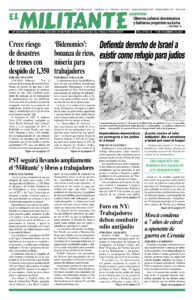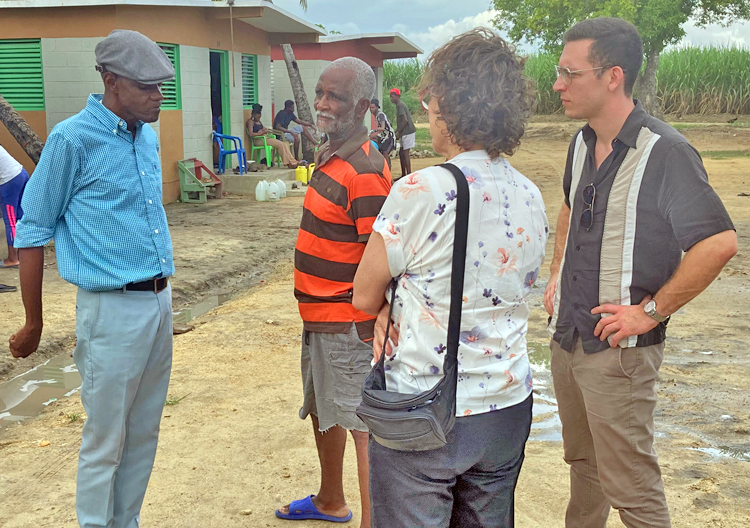LA ROMANA, Dominican Republic — “The gains we have made have been because of our mobilizations in the streets,” Jesús Núñez, national coordinator of the Sugarcane Workers Union (UTC), told the Militant. He described their yearslong fight to win pensions, health care and better working and living conditions for thousands of Dominican and Haitian cane cutters in the sugar plantations here.
Militant reporters visited three sugarcane communities Nov. 11 — Marchena, Plumita, and Santa Lucía — that belong to the Central Romana Corporation, a giant sugar and real estate conglomerate that produces roughly 70% of the sugar in the country.
The workers were eager to tell their stories. In Santa Lucía they invited us to meet at the local evangelical church. We were able to witness the working and living conditions they face, and to learn about the bosses’ assaults on their union. It’s a classic story of a company town.
Workers and their families live in communities known as bateyes on company-owned land. They are secluded among towering fields of sugarcane and crisscrossing dirt roads. The ones we visited were small concrete homes, with cement floors. There are power lines running by, but none of the homes here are connected to the electrical grid. Only supervisors’ housing has electricity. The workers also lack running water.
Workers and their families can live there as long as they work cutting cane or tending the fields. If you are too old, injured or too sick to work, your family can be evicted. In fact, the pastor of the Santa Lucía church was evicted after being injured at work.
Some of the workers are in their 70s, still cutting cane to avoid becoming homeless or face deportation. The majority of the workers are undocumented Haitians or descendants of earlier Haitian migrants who the Dominican government has denied citizenship to, despite their having been born here. We were told Dominican immigration authorities generally don’t enter the bateyes to look for undocumented workers.
If you miss work for a few days, company-armed security guards and “human” resources employees pay a visit to make sure you aren’t working somewhere else. At Plumita, the company has been knocking down housing units that can fit a family and replacing them with smaller units for single men. No families or couples are allowed.
“You can’t even come home and have a glass of cold water,” said Julio, a worker at Plumita, because there is no electricity. “There is no clinic near here or even a first aid kit. If you have an accident you can die.” Many workers showed us scars on their hands from machete cuts. Most cannot read or write, and those who can, have no light to read by after work.
Wages aren’t enough to live on. The workers get tied even more tightly to the plantation by debts they incur to company stores. To buy on credit requires getting a supervisor to vouch for you.
This picture of capitalist exploitation wouldn’t be complete without having a “Shaggy Sports Bet” gambling house within blocks of the bateye.
Workers fight for gains
“Every politician and government official in the region looks after the interests of the company,” said Núñez. “Labor laws exist, but to enforce them we have to fight like hell.”
The fight by sugarcane workers and their union has made partial gains, winning long-overdue retirement pensions, shorter workdays and slightly better pay. Many now make 3,000 pesos ($53) a week, which is a negligible increase, given the cost of living.
The cane cutters used to get paid piecework. Some now work roughly eight-hour shifts, as opposed to working in the fields from the crack of dawn until into the evening, swinging a machete for 12-14 hours.
After the anti-labor practices of the owners of Central Romana became more widely known, U.S. government officials placed a ban on importing the company’s raw sugar in November 2022. “Manufacturers like Central Romana, who fail to abide by our laws, will face consequences,” AnnMarie R. Highsmith, executive assistant commissioner at the U.S. Customs and Border Protection’s Office of Trade, told the media.
Steps like these are used by Washington’s capitalist rulers to better compete with their rivals as they strive to continue to loot the semicolonial world. This “pro-worker” demagogy of the Joseph Biden administration is used to win favored treatment for U.S. bosses.
Working people in the U.S. have no interest in backing Washington’s protectionist moves, but need to use their unions to offer solidarity to fellow workers around the world. We need to use our collective power and the unions to fight independently of the bosses and their political parties, and to back one another’s struggles.
Lessons of Cuban Revolution
Central Romana says it’s the Dominican Republic’s largest private landowner and employer. It is 35% owned by Fanjul Corporation, one of the largest sugar growers and refiners in the United States, with holdings in Florida and Dominican Republic totaling over 400,000 acres.
The Fanjul family set up operations in Florida after the properties they owned in Cuba were nationalized by workers and peasants as they began carrying out a socialist revolution. As part of the transformations carried out by the new revolutionary government led by Fidel Castro, land was distributed to peasants and the brutal and dangerous conditions the sugar bosses — like the Fanjuls — had imposed were eliminated. A massive campaign to teach workers and peasants to read and write, as well as to bring water, electricity, sanitation, transportation and medical services to rural areas helped forge a powerful alliance of workers and peasants.
Some of the UTC members here were interested in learning more about the Cuban Revolution and the communist leadership built by Fidel Castro and the Rebel Army. “I am learning about what happened in Cuba in 1959 and after,” said 69-year-old Antonio Luis, who had worked at the Batey Palave in Haina for 21 years. He has began reading Pathfinder’s Our History Is Still Being Written: The Story of Three Chinese Cuban Generals in the Cuban Revolution.
“It has many important stories I didn’t know about. I’m going to learn now,” he said. “I must have my eyes open so I can see where the holes are, so I won’t fall into them. I can learn about what the goal is.”


